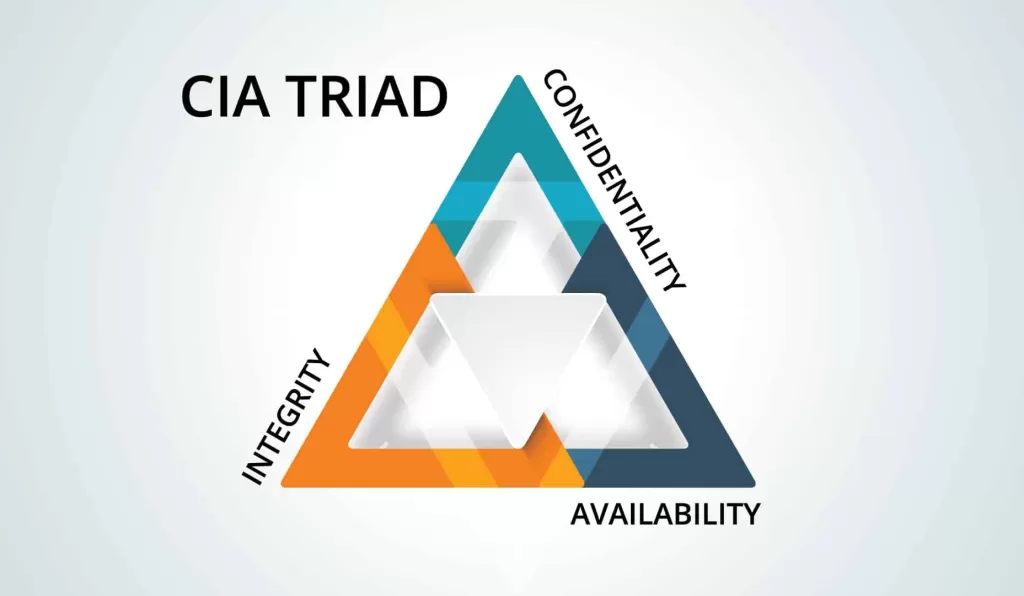Written By:
Scott McAuley
Scott is the IT Director of Texas Management Group, and has been in the IT industry for 25 years.
When it comes to cybersecurity, a strong foundation is essential. But in cybersecurity, what does CIA stand for?
The CIA Triad—Confidentiality, Integrity, and Availability—forms the backbone of every secure system. These three principles guide how information is protected and accessed.
Understanding the CIA Triad is crucial for any organization aiming to safeguard its data from breaches and ensure smooth operations. But what benefits does it bring to the table?
Join me as we unlock the 5 major benefits of the CIA Triad and how it shapes modern cybersecurity!
Key Takeaways
- The CIA Triad—Confidentiality, Integrity, and Availability—provides a comprehensive framework for securing sensitive data against cyber threats.
- Confidentiality ensures that only authorized users have access to crucial data, safeguarding it from unauthorized access and breaches.
- Integrity guarantees that data remains accurate and unaltered, preventing unauthorized changes and ensuring the reliability of information.
- Availability ensures uninterrupted access to data and systems, minimizing downtime and ensuring smooth business operations.
- By balancing confidentiality, integrity, and availability, organizations enhance their overall security posture, reducing vulnerabilities and risks.
Table of Contents
In Cybersecurity, What Does CIA Stand For?

When people hear “CIA,” they often think of the Central Intelligence Agency. However, in cybersecurity, the CIA stands for something else entirely.
Let’s discuss what the CIA triad represents and why it’s the backbone of cybersecurity:
Confidentiality
Confidentiality ensures that only authorized individuals can access specific information. It protects sensitive data from exposure to those who shouldn’t have it.
Techniques such as encryption and strict access control are crucial to maintaining confidentiality. For example, classifying data according to its sensitivity allows organizations to apply the right level of security.
Integrity
Integrity ensures that data remains accurate, reliable, and unchanged during its lifecycle. It guarantees that no unauthorized parties can alter the data either during transmission or storage.
Methods like digital signatures and checksums are used to verify data integrity. This step is essential to prevent any tampering or corruption of crucial information.
Availability
Availability guarantees that information and resources are always accessible to authorized users. Downtime or unavailability can lead to significant business disruptions and losses.
Systems like backup solutions and load balancers are often used to ensure high availability. This ensures that users can access the resources they need without any interruptions.
The History of the CIA Triad
The CIA triad – Confidentiality, Integrity, and Availability – became the backbone of cybersecurity over time.
Let’s dive in to understand how it came to be:
- Early Computer Security: In the early days, computers were isolated, and security wasn’t a priority. As systems became interconnected, the need for formal security measures grew rapidly.
- Confidentiality (1976): The term confidentiality appeared in computer science during a 1976 study by the U.S. Air Force, highlighting the importance of securing classified data. Initially, confidentiality was a priority for military operations, but it quickly expanded to protect personal and business data as technology advanced.
- Integrity (1987): In 1987, a paper titled “A Comparison of Commercial and Military Computer Security Policies” by David Clark and David Wilson emphasized integrity. It recognized the need for maintaining the accuracy of data, especially for accounting and commercial computing.
- Availability (1988): The concept of availability gained traction in 1988, as systems required consistent uptime to support business and government operations. As digital dependence increased, ensuring uninterrupted access became crucial for operational success.
- The CIA Triad (1998): By 1998, the three pillars of Confidentiality, Integrity, and Availability were commonly referred to as the CIA triad. Donn B. Parker expanded the model by adding authenticity, possession, and utility, creating what is known as the hexad.
Today, the CIA triad continues to serve as the foundation of modern cybersecurity. Each element plays a critical role in ensuring data security and operational resilience.
Why is the CIA Triad Important?
The CIA triad – Confidentiality, Integrity, and Availability – is the bedrock of cybersecurity.
Let’s discuss why these three elements are crucial for data protection and maintaining secure environments:
Confidentiality: Protecting Sensitive Information
Confidentiality ensures that only authorized users can access sensitive data. This principle safeguards information from unauthorized access, preventing breaches and data leaks.
Encryption, access controls, and user authentication are core methods for maintaining confidentiality.
Integrity: Maintaining Data Trustworthiness
Integrity ensures that data remains accurate and unaltered throughout its lifecycle. This principle is vital to prevent unauthorized changes, which could compromise trust in critical information.
Organizations use techniques like checksums, digital signatures, and data validation to ensure data integrity.
Availability: Ensuring Uninterrupted Access
Availability guarantees that data and systems are accessible when needed. Organizations must maintain constant access to prevent service interruptions, which could disrupt operations.
Strategies such as backups, load balancing, and redundancy systems ensure that critical data is always available.
What are Examples of the CIA Triad?
The CIA triad – Confidentiality, Integrity, and Availability – is essential in modern cybersecurity.
Let’s dive in to explore specific examples of how each pillar protects data:
Confidentiality: Keeping Data Secure
Confidentiality ensures only authorized individuals access sensitive information. Encryption and multi-factor authentication (MFA) are common methods used in online banking and healthcare systems to secure data.
Confidentiality also involves limiting data storage and transmission points. Sensitive information can be stored in air-gapped systems to prevent unauthorized access.
Integrity: Preserving Data Accuracy
Integrity ensures data remains accurate and trustworthy. Checksums or cryptographic hashes verify that downloaded files have not been tampered with during transmission.
File permissions and user access controls prevent unauthorized changes. In case of accidental deletions, version control and backups restore data to its original state.
Availability: Ensuring Access When Needed
Availability ensures data and systems are accessible when required. Cloud services use redundancy to provide uninterrupted access, even in case of server failure.
Disaster recovery plans prevent data loss during power outages or natural disasters. Off-site backups in separate locations ensure that systems remain available during disruptions.
5 Benefits of the CIA Triad
The CIA triad – Confidentiality, Integrity, and Availability – is the foundation of strong cybersecurity practices.
Let’s explore five key benefits it provides for organizations:
| Benefit | Description |
|---|---|
| Protects Sensitive Information | Ensures only authorized users access data, reducing cyberattack risks. |
| Ensures Data Accuracy | Maintains data integrity, preventing unauthorized changes and ensuring accuracy. |
| Provides Continuous Access | Ensures data is always available, minimizing downtime and disruptions. |
| Strengthens Trust and Compliance | Helps meet regulations and builds trust with customers and regulators. |
| Improves Overall Security Posture | Enhances security by balancing confidentiality, integrity, and availability. |
1. Protects Sensitive Information
Confidentiality ensures that only authorized users have access to important data. This helps protect private information from cyberattacks and data breaches.
2. Ensures Data Accuracy
Integrity guarantees that data remains accurate and unchanged. It prevents unauthorized modifications and ensures the reliability of information.
3. Provides Continuous Access
Availability ensures systems and data are accessible whenever needed. This minimizes downtime and ensures business continuity during disruptions.
4. Strengthens Trust and Compliance
The CIA triad helps organizations comply with regulatory requirements. By securing data, businesses build trust with customers and regulators alike.
5. Improves Overall Security Posture
By balancing confidentiality, integrity, and availability, organizations create a more robust security framework. This reduces vulnerabilities and strengthens defenses against cyber threats.
3 CIA Triad Challenges
The CIA triad—Confidentiality, Integrity, and Availability—is essential for cybersecurity. But even this foundational model comes with its challenges.
Let’s dive into three key obstacles organizations face when implementing the CIA triad:
1. Maintaining Confidentiality
Ensuring data confidentiality is a constant battle. As cyber threats evolve, securing sensitive information from unauthorized access becomes more difficult.
Solution: Organizations must keep up with advanced encryption techniques and access control strategies to stay ahead.
2. Preserving Data Integrity
Keeping data accurate and unchanged is another challenge. Hackers often target systems to alter or destroy information, leading to potential inaccuracies.
Solution: Implementing rigorous validation methods and monitoring for anomalies are crucial in preventing such attacks.
3. Ensuring High Availability
Availability is often threatened by unexpected system failures. Network outages or cyberattacks can disrupt services, making critical data inaccessible.
Solution: Organizations must invest in redundancy solutions and disaster recovery plans to minimize downtime and ensure uninterrupted access to resources.
5 Best Practices for Implementing the CIA Triad
The CIA Triad—Confidentiality, Integrity, and Availability—is essential for strong cybersecurity.
Let’s explore the top practices for effective implementation:
| Practice | Key Action |
|---|---|
| Encrypt All Sensitive Data | Encrypt data at rest and in transit for confidentiality |
| Apply Strict Access Controls | Use MFA and RBAC to limit data access for integrity |
| Schedule Regular Backups | Regularly back up data and store it offsite for availability |
| Monitor and Audit Constantly | Set up real-time alerts and conduct audits to ensure integrity |
| Train Employees Regularly | Provide regular security training to reduce human error |
1. Encrypt All Sensitive Data
Confidentiality requires encryption. Protect your data by encrypting it at rest and in transit. This ensures unauthorized users can’t access it.
2. Apply Strict Access Controls
Integrity depends on limiting who can modify data. Use multi-factor authentication (MFA) and role-based access (RBAC) to restrict data access and prevent unauthorized changes.
3. Schedule Regular Backups
Availability means your data is always accessible. Back up data regularly and store it securely offsite. This ensures you can recover it in case of failure or breach.
4. Monitor and Audit Constantly
Maintaining integrity means constantly watching your systems. Set up real-time alerts and run regular audits to catch and fix vulnerabilities.
5. Train Employees Regularly
Human error is a major risk. Train employees on security best practices to help them spot threats and avoid mistakes that lead to breaches.
Conclusion
The CIA Triad—Confidentiality, Integrity, and Availability—is fundamental to modern cybersecurity. By understanding and applying these principles, organizations can protect their data from threats while ensuring accuracy and accessibility.
Strengthening your cybersecurity framework with encryption, access controls, and regular backups not only safeguards your operations but also builds trust with clients and stakeholders.
Now is the time to prioritize these best practices and ensure your network remains resilient against evolving risks.
Ready to take your cybersecurity to the next level? Let’s continue the conversation and secure your organization together!
Unlock the Full Potential of the CIA Triad for Your Business
Read our blogs for practical advice on safeguarding your systems with these essential cybersecurity principles. Our managed cybersecurity services offer comprehensive solutions to ensure your business remains secure and compliant.
Contact us now for an in-depth assessment!
FAQ
What is CIA in Cyber Security?
CIA stands for Confidentiality, Integrity, and Availability, the key principles of cybersecurity.
What Does CIA Stand For?
CIA stands for Confidentiality, Integrity, and Availability.
What is CIA and AAA in Cyber Security?
CIA refers to Confidentiality, Integrity, and Availability, while AAA stands for Authentication, Authorization, and Accounting.
What is the CIA Triad of Data Governance?
The CIA Triad focuses on ensuring data confidentiality, integrity, and availability in governance practices.






